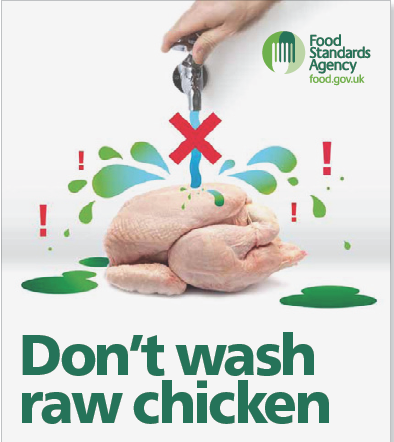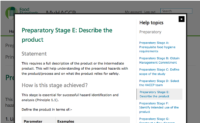UK Food Standards Agency Kicks Off Anti-Campylobacter Campaign

Noting that Campylobacter is the most common cause of food poisoning at national level, UK’s Food Standards Agency (FSA) has launched an aggressive campaign to engage the public in illness prevention. Coinciding with Food Safety Week in the UK, the FSA is urging citizens “to stop washing chicken before cooking it — a practice that can spread Campylobacter bacteria onto hands, work surfaces, clothing and cooking equipment through the splashing of water droplets.”
An April 2014 survey commissioned by the FSA found that in the UK levels of awareness of Campylobacter are well below that of other bacteria that cause food poisoning. More than 90% of the public have heard of Salmonella and E. coli, whereas only 28% of people know about Campylobacter.
The European Food Safety Authority (EFSA) reports that In the European Union overall, despite the first slight drop in five years in cases of campylobacteriosis (the human form of the disease) in 2012, campylobacteriosis remains the most commonly reported zoonotic disease, accounting for 214,000 cases of infection.
An edited excerpt of the FSA's news release follows:
The FSA has issued a call for people to stop washing raw chicken to reduce the risk of contracting campylobacteriosis. The call comes as new figures show that 44% of people [in the UK] always wash chicken before cooking it – a practice that can spread Campylobacter bacteria onto hands, work surfaces, clothing and cooking equipment through the splashing of water droplets.
Campylobacteriosis is the most common form of food poisoning in the UK, affecting an estimated 280,000 people a year. Around four in five of these cases come from contaminated poultry. As part of the call – which comes at the start of this year’s Food Safety Week – the FSA has written to production companies that make food programs, asking them to ensure that people aren’t shown washing raw chicken on TV. The letter... has been co-signed by all of the major food retailers.
Catherine Brown, FSA chief executive, said: “Although people tend to follow recommended practice when handling poultry, such as washing hands after touching raw chicken and making sure it is thoroughly cooked, our research has found that washing raw chicken is also common practice. That’s why we’re calling on people to stop washing raw chicken and also raising awareness of the risks of contracting Campylobacter as a result of cross-contamination.
“Campylobacter is a serious issue. Not only can it cause severe illness and death, but it costs the economy hundreds of millions of pounds a year as a result of sickness absence and the burden on the NHS. Telling the public about the risks and how to avoid them is just one part of our plan to tackle Campylobacter. We are leading a campaign that brings together the whole food chain, which includes working with farmers and producers to reduce rates of Campylobacter in flocks of broiler chickens and ensuring that slaughterhouses and processors are taking steps to minimize the levels of contamination in birds. We are committed to acting on Campylobacter and providing safer food for the nation.”
Related Items
- Letter to broadcasters: A plea from all the major supermarkets and the Food Standards Agency (pdf 895KB)
- Campylobacter awareness study carried out by Harris Interactive in April 2014 (pdf 45KB)
- Information on the FSA's Acting on Campylobacter Together (ACT) program
- Information on the FSA's Campylobacter risk management program
Looking for a reprint of this article?
From high-res PDFs to custom plaques, order your copy today!



